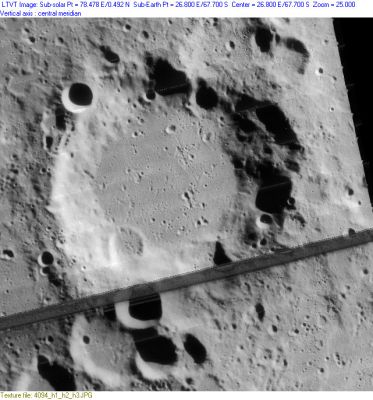Difference between revisions of "Manzinus"
| Line 10: | Line 10: | ||
[http://www.lpod.org/coppermine/thumbnails.php?album=search&type=full&search=Manzinus LPOD Photo Gallery] [http://www.lpi.usra.edu/resources/lunar_orbiter/bin/srch_nam.shtml?Manzinus%7C0 Lunar Orbiter Images]<br /> - Although it is not mentioned in the LPI's search-list of orbital Apollo photographs, the crater called '''Manzinus''' WAS photographed during the mission of Apollo 15. It was captured at the lower central part of frame [http://www.lpi.usra.edu/resources/apollo/frame/?AS15-95-12988 AS15-95-12988].<br /> - Research: Danny Caes.<br /> <br /> | [http://www.lpod.org/coppermine/thumbnails.php?album=search&type=full&search=Manzinus LPOD Photo Gallery] [http://www.lpi.usra.edu/resources/lunar_orbiter/bin/srch_nam.shtml?Manzinus%7C0 Lunar Orbiter Images]<br /> - Although it is not mentioned in the LPI's search-list of orbital Apollo photographs, the crater called '''Manzinus''' WAS photographed during the mission of Apollo 15. It was captured at the lower central part of frame [http://www.lpi.usra.edu/resources/apollo/frame/?AS15-95-12988 AS15-95-12988].<br /> - Research: Danny Caes.<br /> <br /> | ||
==Maps== | ==Maps== | ||
| − | ''([ | + | ''([[LAC%20zone|LAC zone]] 138A2)'' [http://planetarynames.wr.usgs.gov/images/Lunar/lac_138.pdf USGS Digital Atlas PDF]<br /> <br /> |
==Description== | ==Description== | ||
<br /> | <br /> | ||
==Description: Elger== | ==Description: Elger== | ||
| − | ''([ | + | ''([[IAU%20Directions|IAU Directions]])'' MANZINUS.--A walled plain, nearly 62 miles in diameter, with a terraced rampart rising to a height of more than 14,500 feet above the interior. Schmidt shows three craterlets on the floor, but no traces of the small central peak which is said to stand thereon, but to be only visible in large telescopes.<br /> <br /> |
==Description: Wikipedia== | ==Description: Wikipedia== | ||
[http://en.wikipedia.org/wiki/Manzinus_(crater) Manzinus]<br /> <br /> | [http://en.wikipedia.org/wiki/Manzinus_(crater) Manzinus]<br /> <br /> | ||
==Additional Information== | ==Additional Information== | ||
| − | * Depth data from [ | + | * Depth data from [[Kurt%20Fisher%20crater%20depths|Kurt Fisher database]] |
** Westfall, 2000: 5 km | ** Westfall, 2000: 5 km | ||
** Viscardy, 1985: 3.5 km | ** Viscardy, 1985: 3.5 km | ||
** Cherrington, 1969: 2.98 km | ** Cherrington, 1969: 2.98 km | ||
| − | * Satellite crater Manzinus E is [ | + | * Satellite crater Manzinus E is [[radar%20bright|radar bright]] at 70 cm. |
<br /> | <br /> | ||
==Nomenclature== | ==Nomenclature== | ||
Revision as of 15:02, 15 April 2018
Contents
Manzinus
| Lat: 67.7°S, Long: 26.8°E, Diam: 98 km, Depth: 5 km, Rükl: 74 |
Table of Contents
[#Manzinus Manzinus]
[#Manzinus-Images Images]
[#Manzinus-Maps Maps]
[#Manzinus-Description Description]
[#Manzinus-Description: Elger Description: Elger]
[#Manzinus-Description: Wikipedia Description: Wikipedia]
[#Manzinus-Additional Information Additional Information]
[#Manzinus-Nomenclature Nomenclature]
[#Manzinus-LPOD Articles LPOD Articles]
[#Manzinus-Bibliography Bibliography]

LO-IV-094H
Images
LPOD Photo Gallery Lunar Orbiter Images
- Although it is not mentioned in the LPI's search-list of orbital Apollo photographs, the crater called Manzinus WAS photographed during the mission of Apollo 15. It was captured at the lower central part of frame AS15-95-12988.
- Research: Danny Caes.
Maps
(LAC zone 138A2) USGS Digital Atlas PDF
Description
Description: Elger
(IAU Directions) MANZINUS.--A walled plain, nearly 62 miles in diameter, with a terraced rampart rising to a height of more than 14,500 feet above the interior. Schmidt shows three craterlets on the floor, but no traces of the small central peak which is said to stand thereon, but to be only visible in large telescopes.
Description: Wikipedia
Additional Information
- Depth data from Kurt Fisher database
- Westfall, 2000: 5 km
- Viscardy, 1985: 3.5 km
- Cherrington, 1969: 2.98 km
- Satellite crater Manzinus E is radar bright at 70 cm.
Nomenclature
- Conte Carlo Antonio Manzini (1599-1677) was an Italian astronomer and mathematician. His 1660 work, L'occhiale all'occhio, dioptrica practica, is one of the oldest accounts of the techniques for manufacturing lenses through grinding and polishing.
- Named by Riccioli (1651)
LPOD Articles
A Strange Depression
A Second Discovery
Bibliography
This page has been edited 1 times. The last modification was made by - tychocrater tychocrater on Jun 13, 2009 3:24 pm - afx3u2